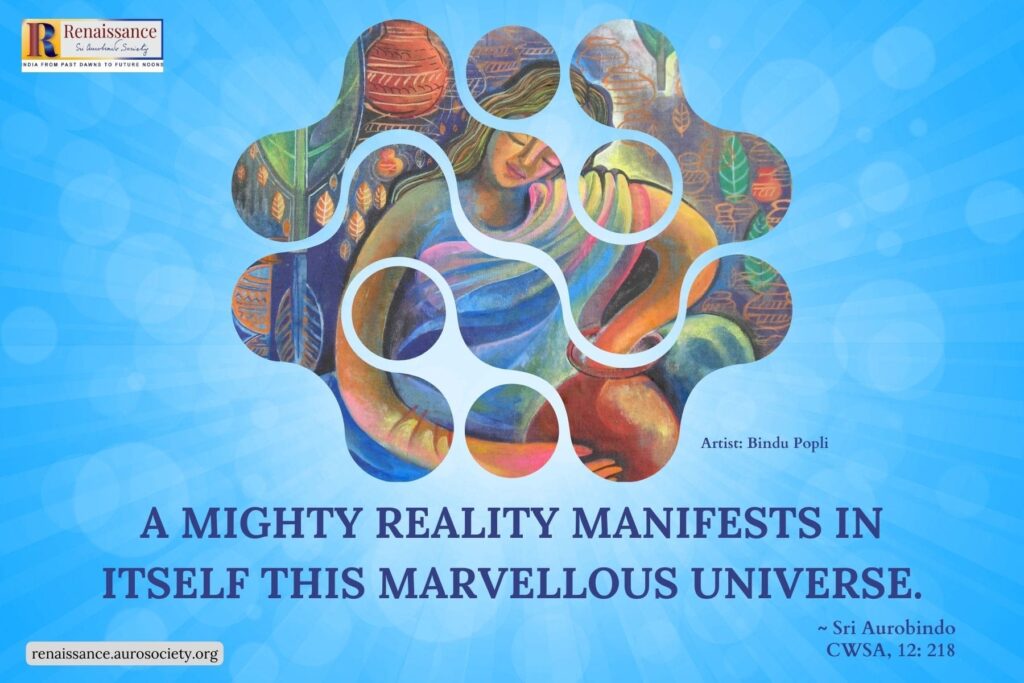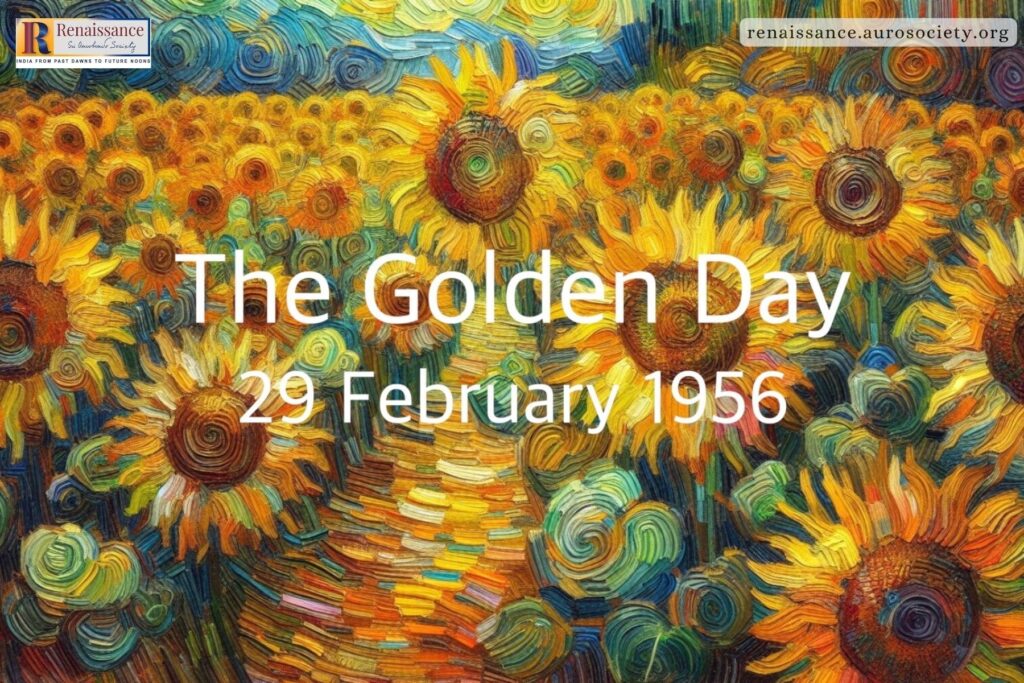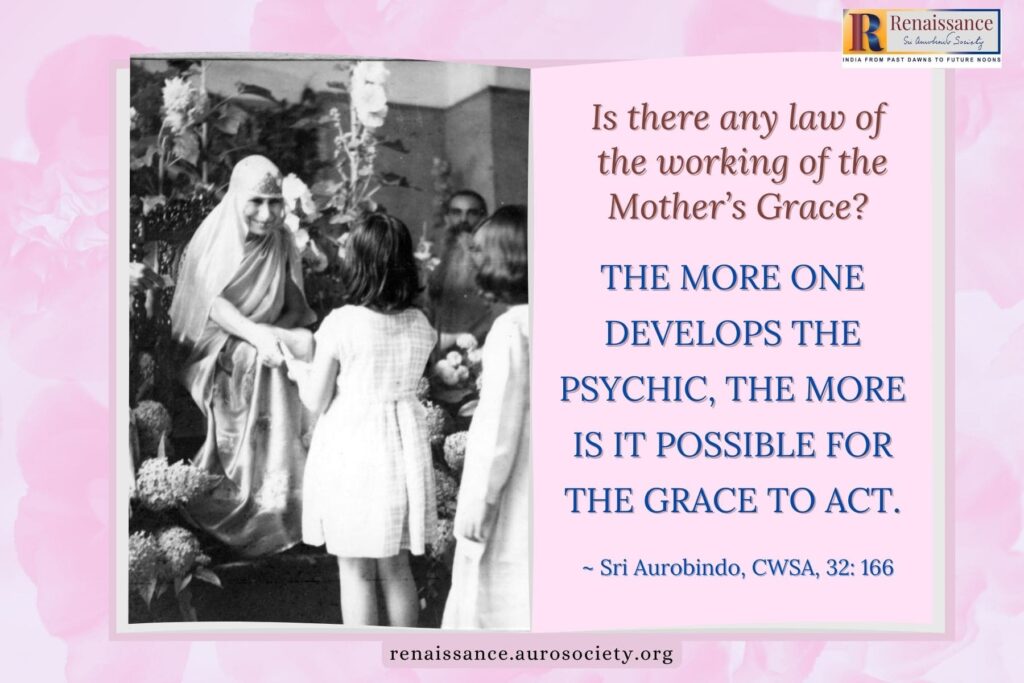Editor’s note: We feature here selected words of Sri Aurobindo on himself on various subjects such as his difficulties in life and work and his reasons for leaving politics. We also feature the conversations in which he replies to disciple’s questions on Sri Aurobindo’s past lives.

The Battle of Life
But what strange ideas again—that I was born with a supramental temperament and had never any brain or mind or any acquaintance with human mentality—and that I know nothing of hard realities. Good God! my whole life has been a struggle with hard realities, from hardship and semi-starvation in England through the fierce difficulties and perils of revolutionary leadership and organisation and activity in India to the far greater difficulties continually cropping up here in Pondicherry, internal and external.
My life has been a battle from its early years and is still a battle,—the fact that I wage it now from a room upstairs and by spiritual means as well as others that are external makes no difference to its character. But of course as we have not been shouting about these things, it is natural, I suppose, for the sadhaks to think I am living in an august, glamorous, lotus-eating dreamland where no hard facts of life or nature present themselves. But what an illusion, all the same!
~ Sri Aurobindo, CWSA Vol. 35, p. 44
***
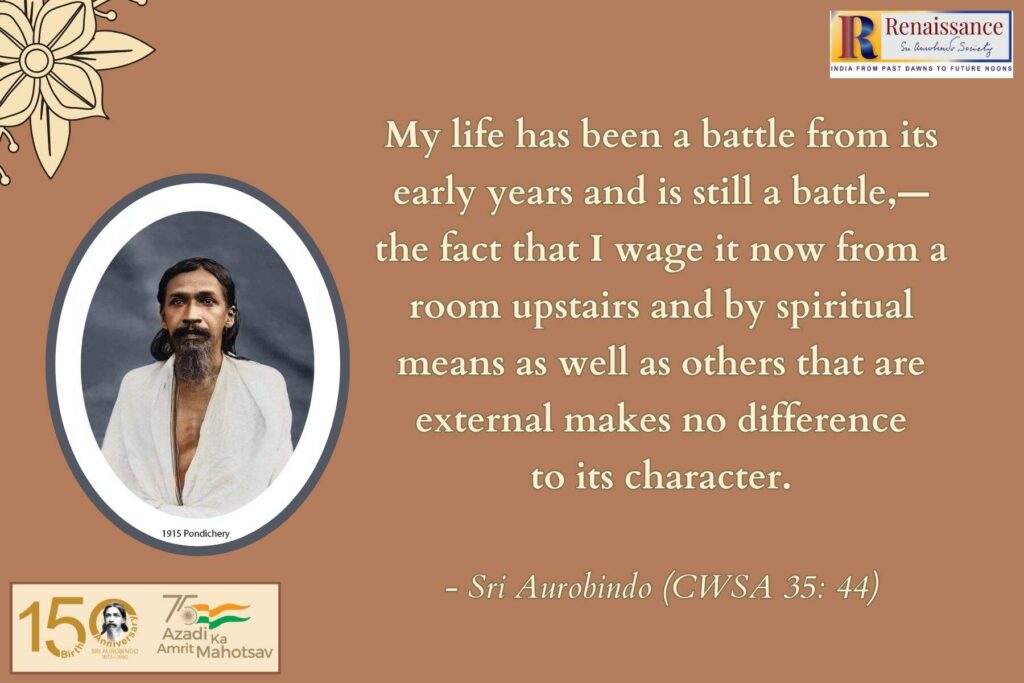
The Burden of Love
It is only divine love which can bear the burden I have to bear, that all have to bear who have sacrificed everything else to the one aim of uplifting earth out of its darkness towards the Divine. The Gallio-like “Je m’en fiche”-ism (I do not care) would not carry me one step; it would certainly not be divine. It is quite another thing that enables me to walk unweeping and unlamenting towards the goal.
~ Sri Aurobindo, CWSA Vol. 35, p. 46
***
Read:
Sri Aurobindo on His Supramentalisation and Immortality
Attitude towards Work
It is not a question of liking but of capacity—though usually (not always) liking goes with the capacity. But capacity can be developed and liking can be developed or rather the rasa you speak of. One cannot be said to be in the full Yogic condition—for the purposes of this Yoga—if one cannot take up with willingness any work given to one as an offering to the Divine.
At one time I was absolutely unfit for any physical work and cared only for the mental, but I trained myself in doing physical things with care and perfection so as to overcome this glaring defect in my being and make the bodily instrument apt and conscious.
It was the same with some others here. A nature not trained to accept external work and activity becomes mentally top-heavy—physically inert and obscure. It is only if one is disabled or too physically weak that physical work can be put aside altogether. I am speaking of course from the point of view of the ideal—the rest depends upon the nature.
As for the deity presiding over control of servants, godown work as well as over poetry or painting, it is always the same—the Shakti, the Mother.
[. . .]
You have to limit your fields and concentrate in order to succeed in them. I don’t make any attempt to be a scientist or painter or general. I have certain things to do and have done them, so long as the Divine wanted; others have opened in me from above or within by Yoga. I have done as much of them as the Divine wanted.
~ Sri Aurobindo, CWSA Vol. 35, pp. 53-54
***
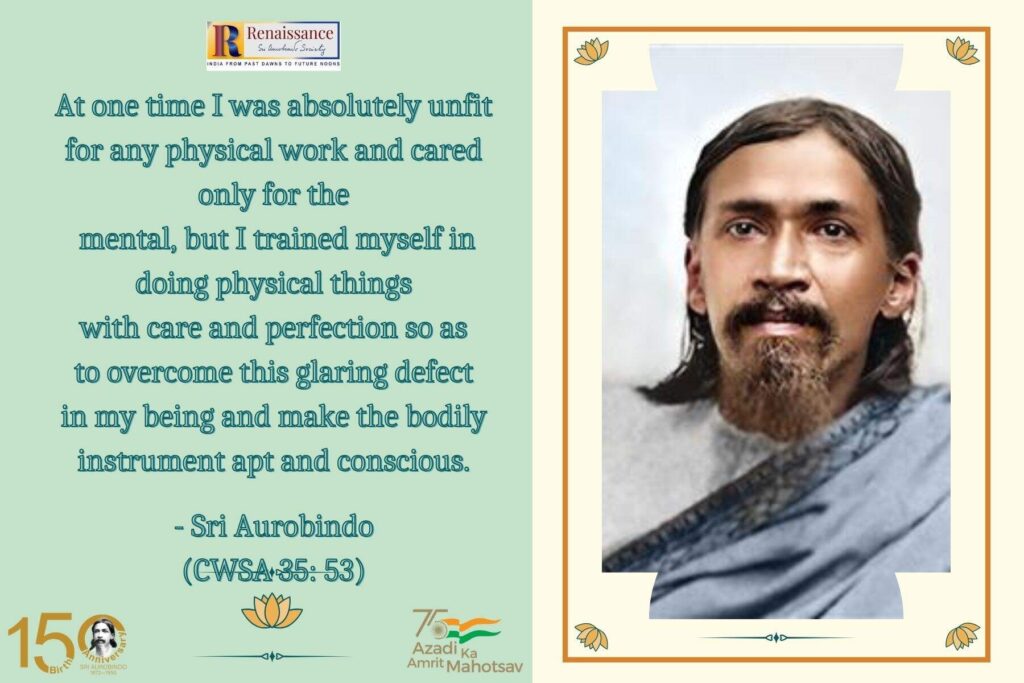
Solid Strength
Disciple: If silence does not contain the fire within, will it not be the silence of a dead man? What can one accomplish without fire, zeal, enthusiasm?
Sri Aurobindo: Zeal and enthusiasm are all right and very necessary but the spiritual condition combines calm with intensity. Psychic fire is different—what you are speaking of here is the rajasic vital fire of self-assertion, aggressive self-defence, exerting lawful rights etc.
Disciple: Fire is the active expression of solid strength. But I feel that this fire is more necessary than solid strength in dynamic work.
Sri Aurobindo: I speak from my own experience. I have solid strength, but I have not much of the fire that blazes out against anybody who does not give me lawful rights. Yet I do not find myself weak or a dead man. I have always made it a rule not to be restless in any way, to throw away restlessness—yet I have been able to use my solid strength whenever necessary.
You speak as if rajasic force and vehemence were the only strength and all else is deadness and weakness. It is not so—the calm spiritual strength is a hundred times stronger; it does not blaze up and sink again—but is steady and unshakable and perpetually dynamic.
– Sri Aurobindo, CWSA, Vol. 35, pp. 46-47
***
Leaving Politics
I may also say that I did not leave politics because I felt I could do nothing more there; such an idea was very far from me. I came away because I did not want anything to interfere with my Yoga and because I got a very distinct adesh in the matter.
I have cut connection entirely with politics, but before I did so I knew from within that the work I had begun there was destined to be carried forward, on lines I had foreseen, by others, and that the ultimate triumph of the movement I had initiated was sure without my personal action or presence. There was not the least motive of despair or sense of futility behind my withdrawal.
For the rest, I have never known any will of mine for any major event in the conduct of the world affairs to fail in the end, although it may take a long time for the world-forces to fulfil it. As for the possibility of failure in my spiritual work, I shall deal with that another time. Difficulties there are, but I see no cause for pessimism or for the certification of failure.
~ Sri Aurobindo, CWSA, Vol. 35, p. 27
***
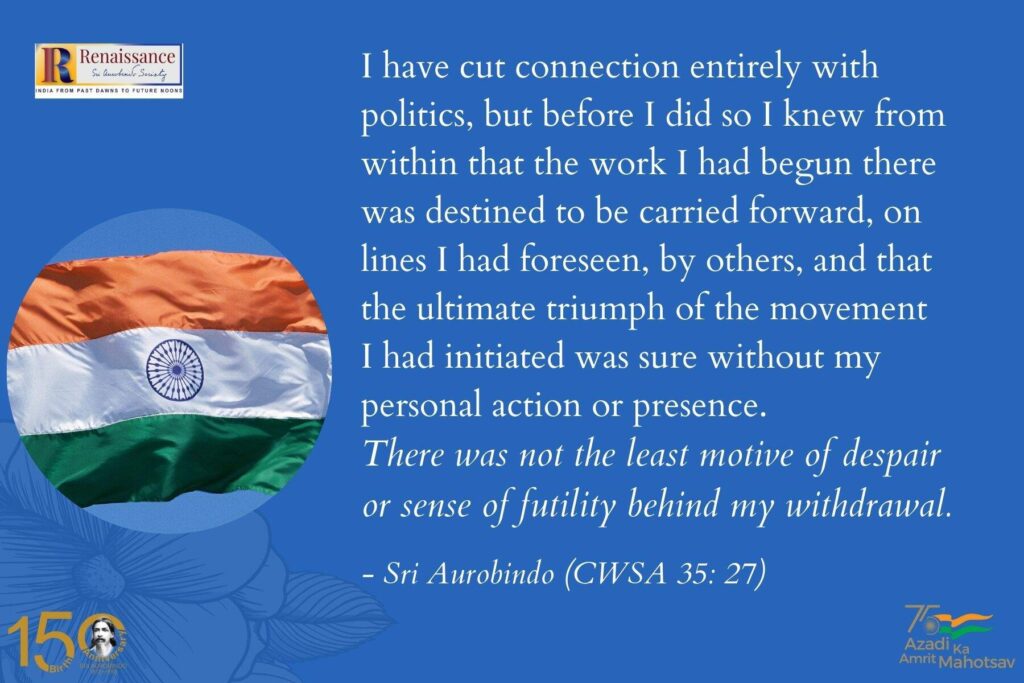
Also Read:
Sri Aurobindo’s Work for India’s Political Liberation
Mother India
Disciple: When you wrote that you looked upon India not as an inert, dead mass of matter, but as the very Mother, the living Mother, I believe that you saw that Truth.
Sri Aurobindo: My dear sir, I am not a materialist. If I had seen India as only a geographical area with a number of more or less interesting or uninteresting people in it, I would hardly have gone out of my way to do all that for the said area.
Disciple: Is there something in what you wrote? Or was it just poetic or patriotic sentiment?
Sri Aurobindo: Merely a poetic or patriotic sentiment—just as in yourself only your flesh, skin, bones and other things of which the senses give their evidence are real, but what you call your mind and soul do not really exist being merely psychological impressions created by the food you eat and the activity of the glands. Poetry and patriotism have of course the same origin and the things they speak of are quite unreal. Amen.
~ Sri Aurobindo, CWSA, Vol. 35, p. 17
***
Heredity and Past Lives
It is true that we bring most of ourselves from past lives. Heredity only affects the external being and all the effects of heredity are not accepted, only those that are in consonance with what we are to be or not preventive of it at least. I may be the son of my father or mother in certain respects, but most of me is as foreign to them as if I had been born in New York or Paraguay.
– Sri Aurobindo (CWSA 35: 55)
***
Speculations about His Past Lives
Disciple: It is reported that you were Kalidasa and Shakespeare. I suppose it is true, at least regarding Kalidasa—isn’t it?
Sri Aurobindo: As to the report, who is the reporter? and in what “Reincarnation Review” have these items been reported?
***
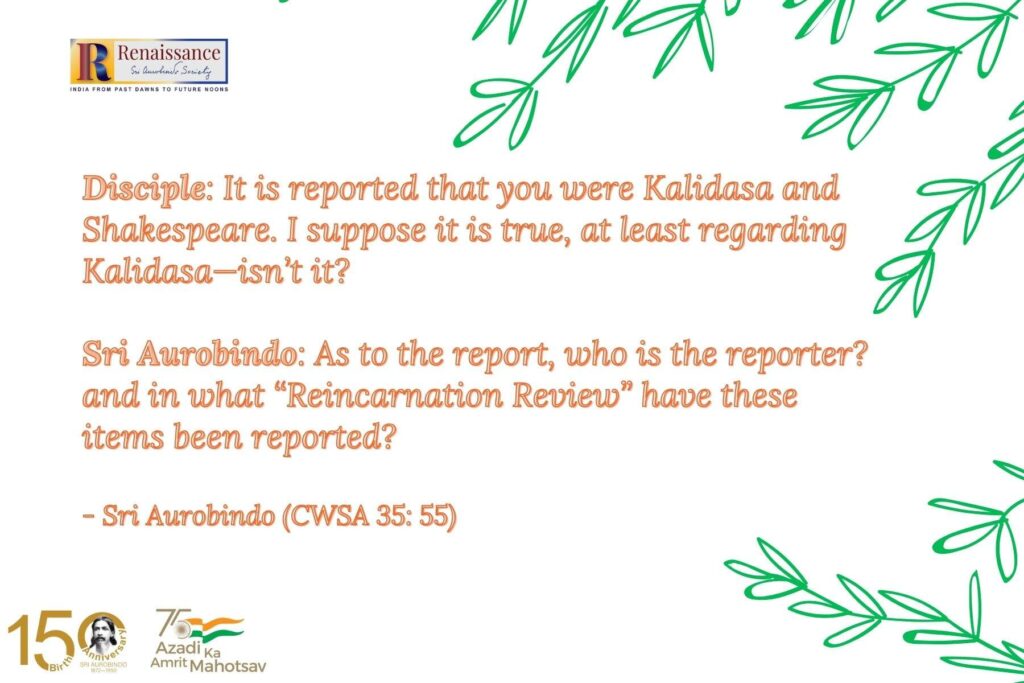
Disciple: We have various guesses about your previous lives. The other day I happened to ask X whether you were Shakespeare. He was diffident. My own belief is that you have somehow amalgamated all that was precious in those that manifested as Homer, Shakespeare, Valmiki, Dante, Virgil and Milton: if not all, at least the biggest of the lot. Kindly let us know the truth. Among your other and non-poetic incarnations, some surmise Alexander and Julius Caesar.
Sri Aurobindo: Good Heavens, all that! You have forgotten that Mrs. Besant claims Julius Caesar. I don’t want to be prosecuted by her for misappropriation of personality. Alexander was too much of a torrent for me; I disclaim Milton and Virgil, am unconscious of Dante and Valmiki, diffident like X about the Bard (and moneylender?) of Avon. If, however, you can bring sufficiently cogent evidence, I am ready to take upon my back the offences of all the famous people in the world or any of them; but you must prove your case.
Seriously, these historical identifications are a perilous game and open a hundred doors to the play of imagination. Some may, in the nature of things must be true; but once people begin, they don’t know where to stop.
What is important is the lines, rather than the lives, the incarnation of Forces that explain what one now is—and, as for particular lives or rather personalities, those alone matter which are very definite in one and have powerfully contributed to what one is developing now. But it is not always possible to put a name upon these; for not one hundred-thousandth part of what has been has still a name preserved by human Time.
***
Disciple: On both occasions when Paul Brunton saw you, he had the impression of you as a Chinese sage. In the early days of my stay here, you struck me as a king of Hungarian gypsies! And when I say Hungarian, I mean the Magyar element which I suppose has mid-Asiatic characteristics. Do these ideas point to some occult truth or some outstanding fact of previous birth?
Sri Aurobindo: Confucius? Lao-Tse? Mencius? Hang-whang-pu? (Don’t know who the last was, but his name sounds nice.) Can’t remember anything about it. As for the Hungarian gypsy, I suppose we must have been everything at one time or another, on this earth in some other cycle. But I am not aware of any particularly Magyar or Chinese element in me. However, when I came here, I was told I looked just like a Tamil sannyasi and some Christians said I was just like Christ. So it may be.
More seriously, Brunton seems to have thought I was Lao-Tse. Maybe, I can’t say it is impossible.
***
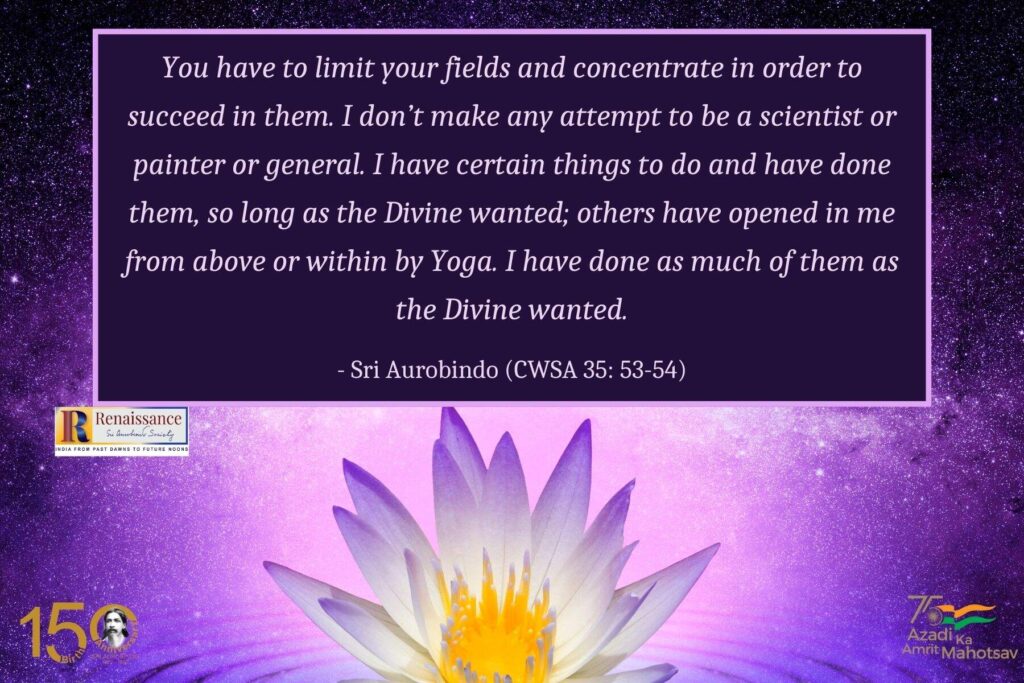
Disciple: The Mother or you are said to have declared that a divine descent was attempted during the Renaissance, with Leonardo da Vinci as its centre—a very credible report since we believe you were Leonardo and the Mother Mona Lisa. I shall be much interested to know something about the inner side of this phenomenon. Was Leonardo aware of a semi-avatarhood or a pressure of spiritual planes?
Sri Aurobindo: Never heard before of my declaring or anybody declaring such a thing. What Leonardo da Vinci held in himself was all the new age of Europe on its many sides. But there was no question of Avatarhood or consciousness of a descent or pressure of spiritual planes. Mysticism was no part of what he had to manifest.
~ Sri Aurobindo, CWSA, Vol. 35, pp. 55-57
See:
Sri Aurobindo: His Birth Unique, His Presence Ubiquitous

~ Design: Raamkumar

